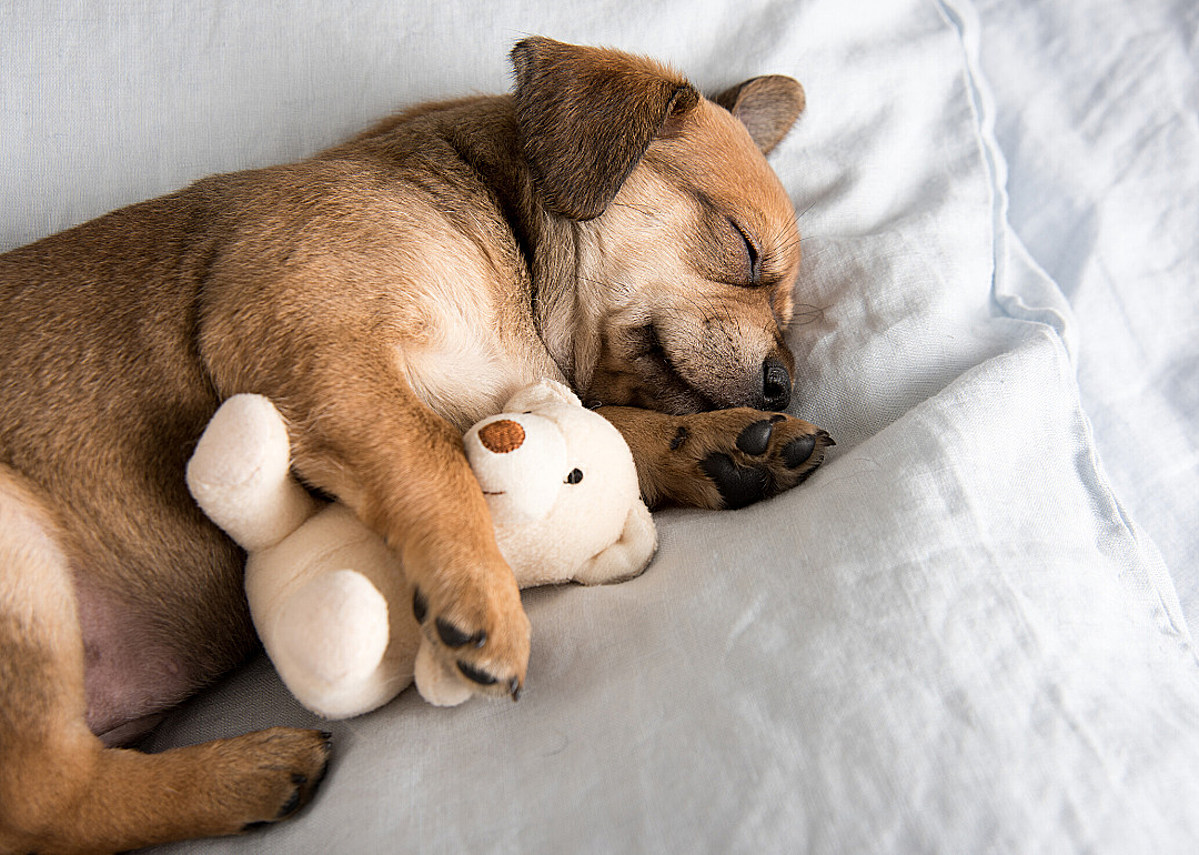
Congratulation on coming here! As much as we love our furry friends, it’s important to remember that they need a lot of rest and sleep to grow and stay healthy. Puppies need up to 20 hours of sleep daily to support their physical and mental development! However, getting your puppy to sleep can be easier said than done. They may be too excited to settle down or wake up in the middle of the night and demand your attention. Don’t worry, though – we’re here to help. In this article, we’ll share 5 easy ways to force puppies to sleep and ensure they get the rest they need.
But first, let’s look at why sleep is so important for puppies. According to a study by the American Kennel Club, puppies who don’t get enough sleep may experience developmental delays, behavioral issues, and even immune system problems. On the other hand, puppies who get adequate sleep are more likely to be well-behaved, trainable, and healthy. So, if you want your puppy to be the best version of themselves, it’s crucial to prioritize their sleep needs.
Now, let’s dive into the fun part – how to force puppies to sleep! We promise these tips are both effective and humane. So, please grab a cup of tea (or a glass of wine, we won’t judge) and prepare to help your pup sleep like a champ.
When to force Puppies to Sleep
As with many things in puppy parenting, the answer depends on various factors. However, you can follow some general guidelines to ensure your puppy gets enough sleep without disrupting its natural sleep cycle.
It’s important to remember that puppies have different sleep needs than adult dogs. While adult dogs may be content with sleeping 12-14 hours daily, puppies require much more sleep to support their rapid growth and development. Puppies can sleep up to 20 hours daily, depending on their age and breed.
So, when should you force puppies to sleep? The short answer is – often! Puppies tend to get overtired and overstimulated, leading to behavioral problems and health issues. As a rule of thumb, you should give your puppy plenty of opportunities to rest and nap throughout the day.
One good strategy is to establish a consistent sleep schedule for your puppy. Puppies thrive on routine, so try to put them down for naps simultaneously every day. You can also use a crate or playpen to help your puppy feel safe and secure while they sleep and prevent them from being overstimulated by their surroundings.
Of course, there are also times when it’s natural for your puppy to be awake and active. For example, puppies may be more energetic in the morning or after a meal. You can use this time to engage with your puppy in play or training activities, but give them breaks to rest and recharge as needed.
Observing your puppy’s behavior and adjusting their sleep schedule accordingly is key. If your puppy seems restless or agitated, it may be time for a nap. On the other hand, if they’re playful and alert, they may be ready for some stimulating activity.
5 Easy Ways to force Puppies to Sleep
We already know how important it is for puppies to get enough sleep and what problems can arise if they don’t, So below are 5 ways to force puppies to sleep.
Create a Consistent Sleep Environment
As with most things, consistency is key in helping your puppy get a good night’s sleep. Creating a consistent sleep environment will signal to your puppy that it’s time to wind down and rest. Here are some tips for setting up a consistent sleep routine for your puppy:
Establish a consistent sleep schedule for your puppy: Puppies thrive on routine, which is crucial for their well-being. Establish a bedtime and wake-up time that you can use daily, even on weekends. This will help regulate your puppy’s internal clock and make it easier for them to fall asleep and wake up naturally.
Provide a comfortable sleeping area for your puppy: Just like humans, puppies need a comfortable and safe sleeping area to feel secure and relaxed. Consider investing in a cozy dog bed or crate your puppy can call their own. Place the bed or crate in a quiet, low-traffic area of your home, away from any potential distractions or sources of noise.
Reduce noise and light in the sleeping area: Dogs are sensitive to light and sound, so it’s important to create a dark and quiet sleeping environment for your puppy. Use blackout curtains or shades to block out any light that may filter into the room.
Use a crate or playpen to keep your puppy contained: Puppies have a lot of energy and may be tempted to wander around the house at night, disrupting their sleep. Using a crate or playpen can keep your puppy contained and prevent them from getting overstimulated at night. Just be sure to make the crate or playpen a positive and comfortable space for your puppy by including cozy blankets, toys, and treats.
Exercise and Playtime
One of the best ways to ensure your puppy gets a good night’s sleep is by providing plenty of exercise and playtime during the day. Puppies are naturally energetic and curious and need physical and mental stimulation to stay healthy and happy. Keeping your puppy active and engaged during the day can help them burn off excess energy and sleep more soundly at night.
So, what kinds of activities should you be doing with your puppy? That depends on their age, breed, and personality, but there are a few general guidelines to remember. For starters, most puppies need at least 30 minutes to an hour of exercise daily, split up into several shorter sessions. This could include walks, runs, fetch games, tug-of-war, or swimming.
In addition to physical exercise, providing your puppy with mental stimulation is important. This could include training sessions, puzzle toys, or interactive games like hide-and-seek. By engaging your puppy’s brain and body, you can help tire them out and reduce their anxiety and restlessness.
Of course, keeping your puppy’s age and health in mind is important when planning their exercise routine. Younger puppies may not be able to handle as much exercise as older ones, and certain breeds may require more or less activity than others. Always consult with your veterinarian before starting a new exercise routine, and pay attention to your puppy’s body language to ensure they’re not overexerting themselves.
Finally, avoiding vigorous exercise or playing too close to bedtime is important. While it may seem counterintuitive, exercising your puppy too close to bedtime can make them more wired and restless, making it harder for them to fall asleep. With some planning and patience, you can help your puppy get the exercise they need to sleep soundly through the night.
Calming Activities
When it comes to helping your puppy fall asleep, it’s important to create a relaxing environment and provide calming activities that help them wind down. Here are some tips for incorporating calming activities into your puppy’s bedtime routine:
Aromatherapy: Certain scents can have a calming effect on puppies like humans. You can use essential oils or scented candles to create a soothing atmosphere in your puppy’s sleeping area. Lavender and chamomile are popular choices for promoting relaxation, but make sure to dilute any oils you use and keep them out of your puppy’s reach.
Calming music: Playing soft, calming music can also help your puppy relax and fall asleep. There are even playlists specifically designed for puppies, with gentle melodies and sounds that mimic the heartbeat and breathing of a mother dog. You can find these playlists on music streaming services or YouTube.
Massage: Just like humans, puppies can benefit from a gentle massage to help them unwind. You can use your fingertips to stroke your puppy’s fur or gently rub its ears, paws, and belly. This can help release tension and promote relaxation.
Special blankets or toys: Some puppies find a favorite blanket or toy comforting. You can provide a special blanket or toy your puppy associates with sleep time and only give it to them when it’s time to sleep. This can help them feel more secure and relaxed.
Remember, the key to incorporating calming activities into your puppy’s bedtime routine is to be consistent. Use the same scents, music, and toys every night, and try to establish a regular bedtime routine that signals to your puppy that it’s time to sleep.
Feeding Schedule
A consistent feeding schedule can affect your puppy’s sleep habits. Like humans, puppies can experience digestive discomfort and energy spikes if they eat too close to bedtime. Here’s how to establish a feeding schedule that promotes restful sleep for your furry friend.
First, determine how often you should feed your puppy based on age and breed. Generally, puppies need to eat more frequently than adult dogs, as they have smaller stomachs and higher energy needs. Most puppies must eat three to four meals a day until they’re six months old and then transition to two meals daily.
Next, decide on specific meal times that suit your schedule and your puppy’s needs. Stick to these times as closely as possible to establish a routine. For example, you might feed your puppy daily at 7 am, 12 pm, and 5 pm. Avoid feeding your puppy too late, leading to indigestion and restlessness. Aim to finish feeding your puppy at least 2-3 hours before bedtime.
Additionally, monitor your puppy’s water intake before bedtime. While it’s important to keep your puppy hydrated throughout the day, you want them to drink only a little water before bed, as this can lead to accidents during the night. Limit water intake in the hours leading up to bedtime, and take your puppy outside to potty right before bed.
Of course, every puppy is different, so paying attention to their individual needs and adjusting their feeding schedule accordingly is important. For example, if your puppy seems particularly hungry or restless at night, you may need to adjust their meal times or portion sizes. On the other hand, if your puppy seems lazy or disinterested in food, it may be getting too much food or not enough exercise.
Positive Reinforcement
Positive reinforcement is your best friend when training your puppy to sleep through the night. Rather than punishing your puppy for waking up or being restless, focus on rewarding them for good behavior. This will help them associate sleep with positive feelings and create a sense of routine and consistency.
There are many ways to use positive reinforcement to encourage good sleep behavior. For example, you can offer your puppy a special treat or toy when they go to bed on time and sleep through the night. You can also use verbal praise and affection to let them know they’re doing well.
Another effective method is to create a sleep routine that your puppy can associate with positive feelings. For example, you can play soothing music or offer a calming scent, like lavender, to help them relax. You can also use a special blanket or toy your puppy can only use at bedtime. This will create a sense of comfort and security that can help them sleep more soundly.
It’s important to remember that positive reinforcement is not about bribing or spoiling your puppy. Rather, it’s about rewarding them for making good choices and encouraging them to continue those behaviors. By using positive reinforcement, you’re building a strong bond with your puppy and helping them learn good habits that will benefit them throughout their life.
Some Advantages of Forcing Puppies to Sleep
While it may seem counterintuitive to force puppies to sleep, many advantages exist. Helping your puppy get enough sleep is one of the most important things you can do for their health and well-being. Here are just a few of the benefits of forcing your puppy to sleep:
Supports physical and mental development: Puppies who get enough sleep are better able to grow and develop properly. When they sleep, their bodies and brains are hard at work repairing and restoring themselves. This means puppies who sleep well are likelier to be healthy and strong as they grow.
Reduces behavioral issues: Sleep-deprived Puppies are more likely to be cranky, irritable, and hyperactive. This can lead to behavioral issues like biting, chewing, and destructive behavior.
Improves immune function: Sleep is crucial in maintaining a healthy immune system. Puppies who don’t get enough sleep are more susceptible to illnesses and infections. By prioritizing your puppy’s sleep needs, you can help them stay healthy and avoid costly trips to the vet.
Makes training easier: Well-rested puppies are more focused and receptive to training. When tired, they’re more likely to be distracted, disobedient, and resistant to learning. Ensuring your puppy gets enough sleep can set them up for success in their training and help them learn new behaviors more easily.
Improves overall quality of life: Just like humans, puppies need rest and downtime to be at their best. They’re more energetic, playful, and affectionate when they’re well-rested. They’re also less likely to be stressed or anxious, leading to a happier and more fulfilling life for you and your pup. So, You can help your puppy grow, learn, and thrive by prioritizing their sleep needs.
Some Disadvantages of Force Puppies to Sleep
Forcing a puppy to sleep may cause them to become overly dependent on you. Puppies forced to sleep at a certain time may struggle to self-soothe and fall asleep independently when needed. This can lead to separation anxiety and other behavioral issues down the line. So, while it’s important to establish a consistent sleep schedule, giving your puppy some autonomy and space to learn how to sleep on their own is crucial.
Another potential disadvantage of forcing a puppy to sleep is that it may cause them to miss valuable play and socialization time. Puppies are naturally curious and energetic and need plenty of opportunities to explore their environment, interact with other dogs and people, and learn new things. If you force your puppy to sleep during their active hours, you may deprive them of these critical experiences. It’s essential to balance sleep and playtime to ensure your puppy grows up healthy and well-adjusted.
Conclusion
We hope this article has provided some helpful tips and tricks for getting your puppy to sleep. Remember, puppies need a lot of rest and sleep to grow and stay healthy, so it’s important to prioritize their sleep needs. By following these tips, you can ensure that your furry friend gets the rest they need and wakes up refreshed and ready to play.
But, we want to emphasize that every puppy is different, and what works for one may not work for another. Be patient and experiment with different methods until you find the best for your puppy. And, if you’re still struggling to get your puppy to sleep, don’t hesitate to consult your veterinarian for additional guidance. Thank you for reading, and we wish you and your puppy many sweet dreams!









I don’t think the title of your article matches the content lol. Just kidding, mainly because I had some doubts after reading the article.